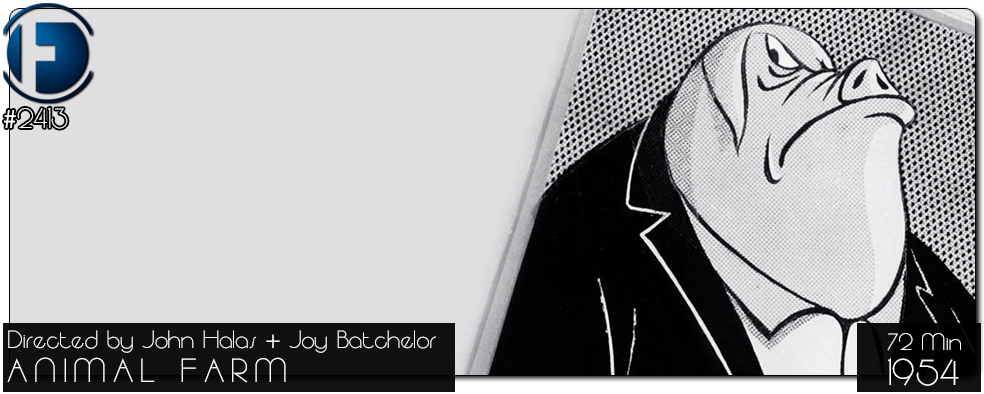Movie Review – Animal Farm (1954)
Principal Cast : Gordon Heath, Maurice Denham.
Synopsis: A successful farmyard revolution by the resident animals vs. the farmer goes horribly wrong when the victors create a new tyranny among themselves.
********
A staple amongst many a mid-century classroom reading remit, George Orwell’s 1945 novella “Animal Farm” was met with great acclaim upon its release; as a stark, pointed skewering of communism and the corruption of humans seeking power, the story was a melancholy satire of modernity that would prove a captivating and evocative literary touchstone for generations to come. In the early 50’s, Orwell’s widow unwittingly sold the film rights to undercover CIA Agents (!), who turned around and made what can best be described as a somewhat bastardised propogandist take on Orwells classic, retaining some of Orwell’s socialist ideas and modifying some of the more elegiac subtextual themes. As an animated film, Animal Farm is most definitely not something Disney might produce – for a start, there are a number of horrifying animal deaths contained within, not the least ghastly being that of a small cat mauled to death by frenzied hounds – but it was shown repeatedly in classrooms to young children of a specific age, no doubt traumatising them similarly to the Watership Down era.
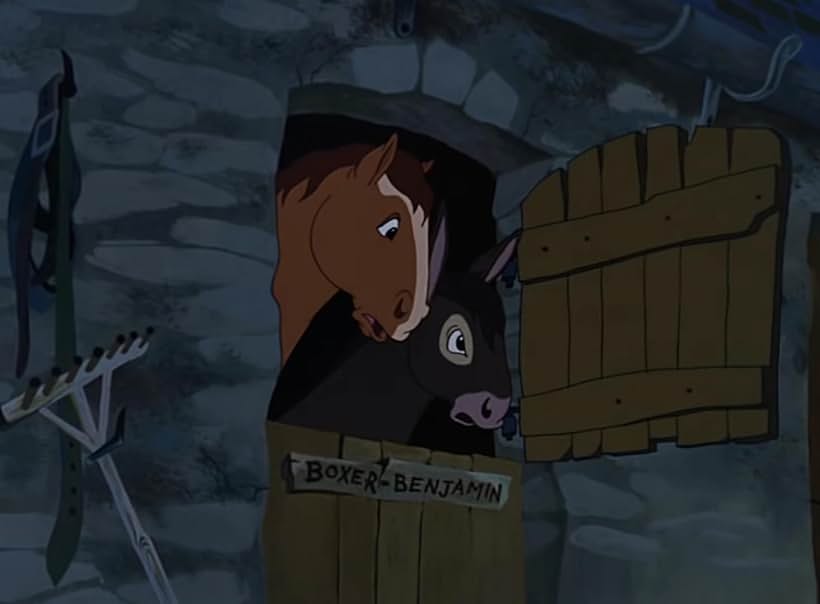
Set on a rural English farm, run by a drunken landowner, Mr Jones, all the animals decide to rise up and boot the humans off the property and run it themselves as a kind of utopian ideal where every animal is equal, without a ruler. Inevitably, however, friction arises when a power-hungry pig, Napoleon, uses force to become the farm’s default leader, a dictator if you will, who rules with an iron fist and the sharp teeth of his canine lieutenants. As the years pass, Animal Farm (as it comes to be known) falls into the same pitfalls and traps of modern society, with a rich elite dining off the labour of a poor underclass, until yet another revolution threatens to disturb the status quo.
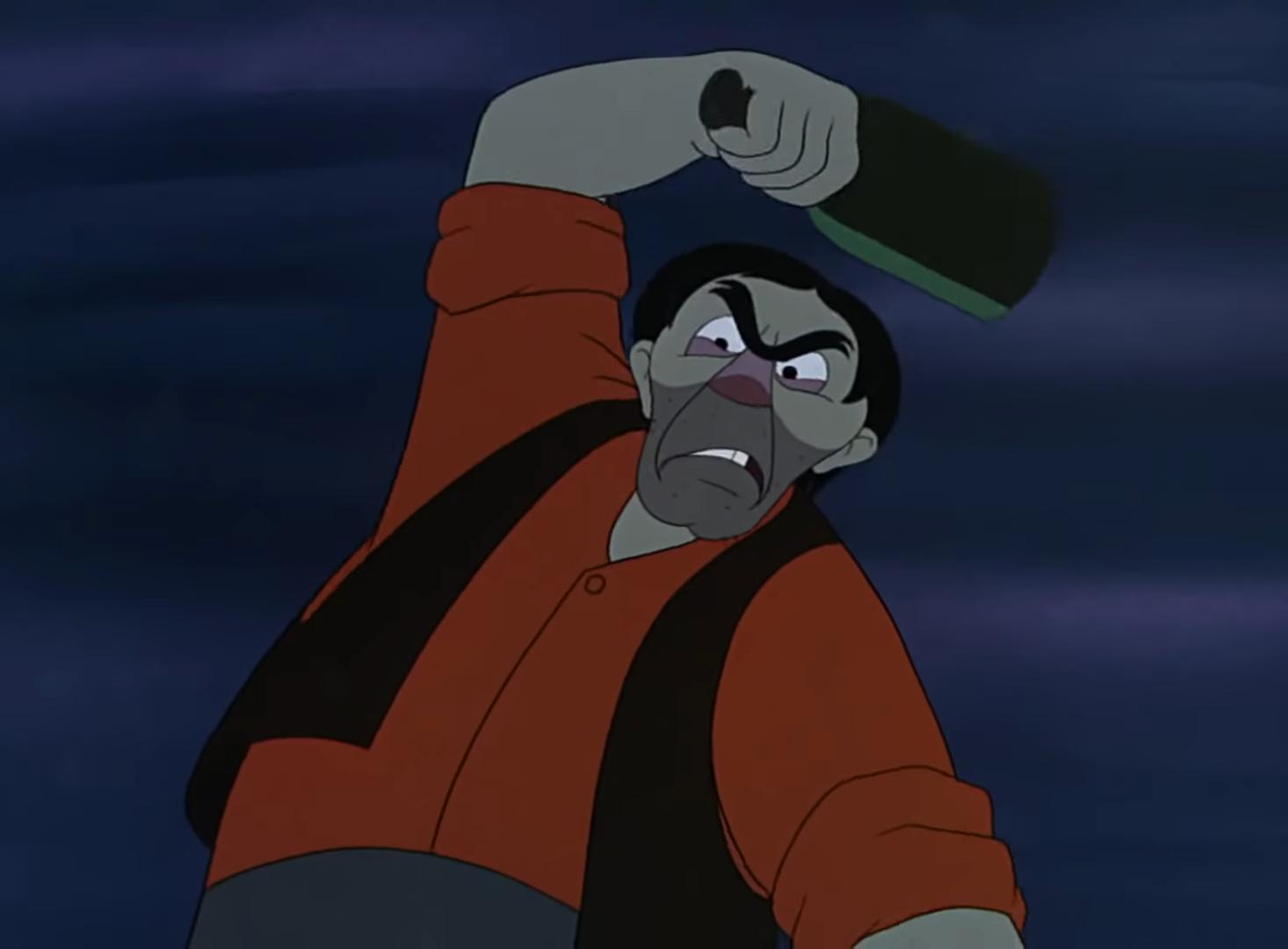
From its diegetic narration by Gordon Heath, and the terrific vocal work from voice artist Maurice Denham – who performed all the human and animal voices, and grunts, squeals, barks and whinnies heard throughout – Animal Farm is very, very dark in tone, and confronting in its approach to violence and thematic prescience. Themes of inequality, power and control, class stratification and corruption form the varied central tenets of Orwell’s original text, and they’re replicated here with some judicious propogandist slants thanks to both directors John Halas and Joy Batchelor, together with co-writers Borden Made, Philip Stapp and Lothar Wolff, and the ample backing of the CIA funding the whole enterprise. To suggest there’s a bias with this version of Animal Farm is to state the obvious, but as a piece of artistic license it does exactly what one might expect from Orwell’s notable text and juxtaposes a modernised, fearful, semi-scandalous finger-wag at even 21st century proponents of fascistic rule – looking directly at President Donald Trump and his asinine allies as I write this – to the point it’s painfully obvious to all whom, and what, this film represents.

Initially a scolding fable about communism, particularly through Stalin and Lenin’s USSR and the rise of the Cold War following the end of World War II, Animal Farm is just as excoriating today for a gamut of reasons, chief among them being the rise of far right fascism, imperialistic nationalism, and of course, the corruption on full display in the halls of power across the globe. While I’d hardly suggest Orwell, nor the writers and producers of this film, had a Donald Trump or an Elon Musk in mind when they wrote Animal Farm’s various incarnations, which only goes to show just how inept of thoughts and nuance these same, tired old assholes tend to be. Power corrupts absolutely, and it’s always the little guy who gets trampled. Little wonder Animal Farm has fallen out of favour as a text to be taught in schools, particularly in the United States these days, if only because it points a big stick directly as facile morons like Trump and Co and makes them seem, like Napoleon in this story, pigs in a trough. Eventually, hopefully, there will come a revolution.
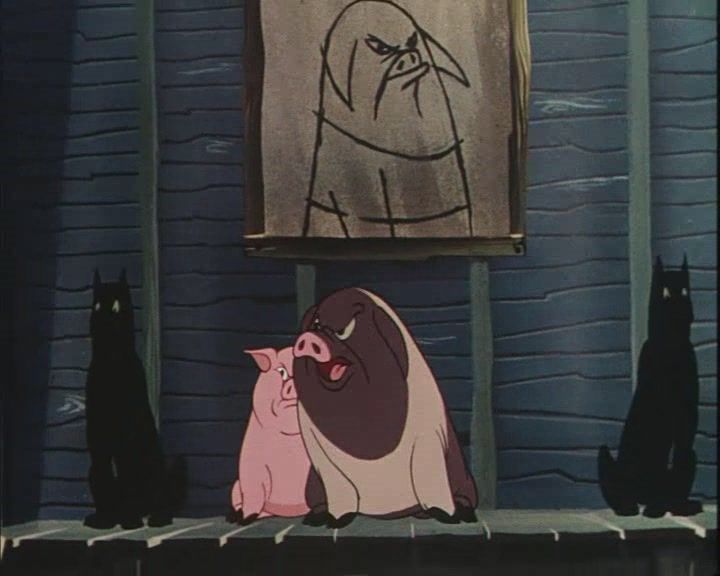
Animal Farm is a film of comparatively limited production budget, notable alongside Disney films of the decade including Cinderella, Peter Pan and Alice In Wonderland, all of which look a lot more expensive than the relatively miniscule budget afforded this project. That’s not to say Halas and Batchelor don’t acquit themselves superbly, because there are some tremendous moments of narrative storytelling to be found here, with some stark, often terrifying sequences of animal horror that remain jarring for their realism and brutality. As I mentioned earlier, this isn’t a project Disney would permit to spawn from their cutesy-pie animation stable; as blood-soaked animal corpses strewn across a farmyard, in a particularly shocking moment, I was reminded just how powerful non-Disney animation could be from creative minds. The screams of animals in pain is never something folks like to listen to, and Maurice Denhams raspy Mel Blanc-adjacent tones capture the grizzled, gritty horror of Napoleon’s cruel leadership and the suffering of the farm’s inhabitants an almost suffocatingly despairing tone unlike any modern film could convey. Certainly not without obtaining a severe adult-oriented censorship rating. I despair that animated films aimed at kids aren’t made like this any more, watered down with cloying sentimentalist cuddles is about as close to challenging subtext as we get these days.
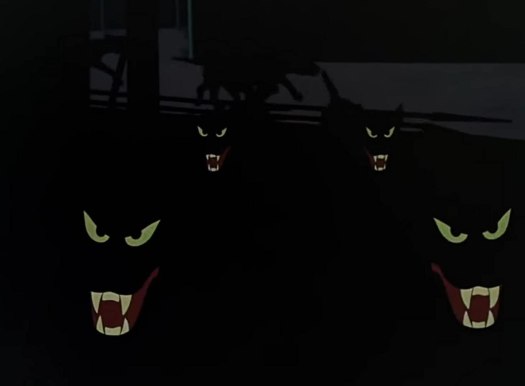
From its surreal sound design, fantastic 50’s-era voice work and powerful, incredibly bleak storytelling, it’s hard not to heap praise on Animal Farm for its statement about authoritarianism delivered with such ferocity and zeal. Although I deplore the manner in which the production changed Orwell’s original ending – Orwell’s text ended on a very downbeat note of similarity between humans and the pigs representative of corrupted control in this narrative, whereas in this film the rest of the farm animals end up revolting against Napoleon’s dictatorial rule in a brief, almost unrealised moment of euphoric comeuppance – there’s no denying the power of the story at the heart of this thing: oppressors are removed, and the formerly oppressed eventually rise up to become new oppressors, in a great circle of life, and everywhere you look within the hokey, sometimes clunky animation you can see parallels of the entirety of human existence. Animal Farm is a remarkable film achievement in that it overcomes limitations of both technology and style with a single-minded, somewhat propagandised, mission to alarm and alert viewers as to just how easily a society can slip into the rule of a dictator, fascists and malignant power-hungry assholes. Look around. Are we in Animal Farm right now?
After all, all animals are equal, but some animals are more equal than others….

